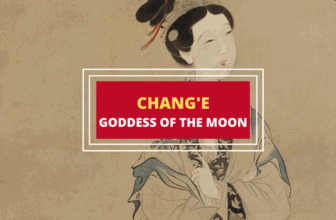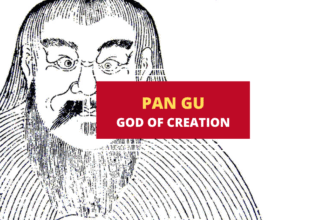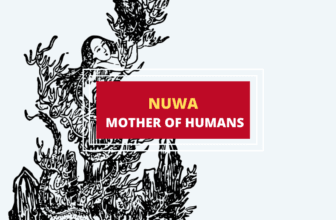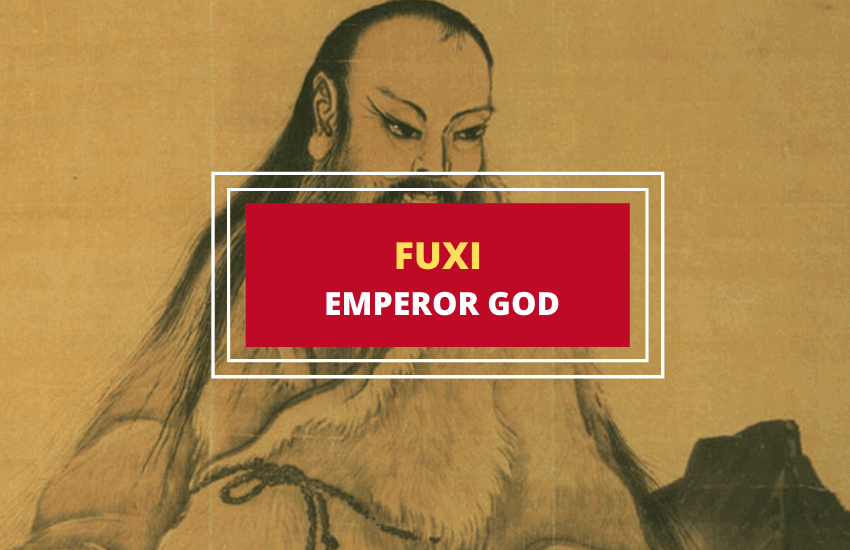
Table of Contents
China has a long history, rich with folk beliefs, religious stories, legends and myths. Long before the first Chinese dynasty, wise men and demigods ruled—and one of them was Fuxi. He’s regarded one of the culture heroes who made a lot of contributions to people. Here’s a look at his role in the culture’s legendary history.
Who Is Fuxi?
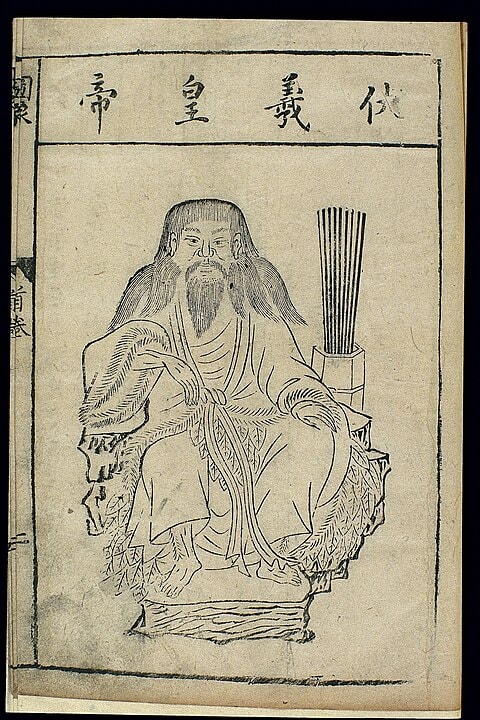
Also spelled Fu Hsi, Fuxi was one of the most powerful primeval gods—the first of the Three Sovereigns, along with Nuwa, and the Divine Farmer, Shen Nong. In some texts, he’s shown as a god who ruled as a divine emperor on earth. He’s also known as a human ancestor who procreated humans by marrying his sister Nuwa, and thereby establishing the marriage rule in remote antiquity.
Unlike the names of most other gods, Fuxi’s name has several variations. In ancient literature, he may be referred to as Baoxi or Paoxi. During the Han dynasty, he was called Tai Hao which means The Great Bright One. Different names may suggest different meanings, such as hidden, victim, and sacrifice. Historians speculate that these might be related with ancient mythologies once linked to him but are now lost.
In paintings, Fuxi is often pictured with his sister Nuwa, where the two deities are depicted with human figures linked by serpentine lower bodies. However, he’s a classical figure with many faces, as some representations also depict him as a man clothed with animal skins. Legend has it that he lived for 168 years and then became immortal.
Fuxi is recognized for many cultural inventions, which turned him into one of the greatest culture heroes of China. The myths about him are thought to originate from Zhou dynasty, but the written records of Chinese history can only be traced back as far as the 8th century BCE, so many historians believe that Fuxi and the Three Sovereigns were just made-up stories.
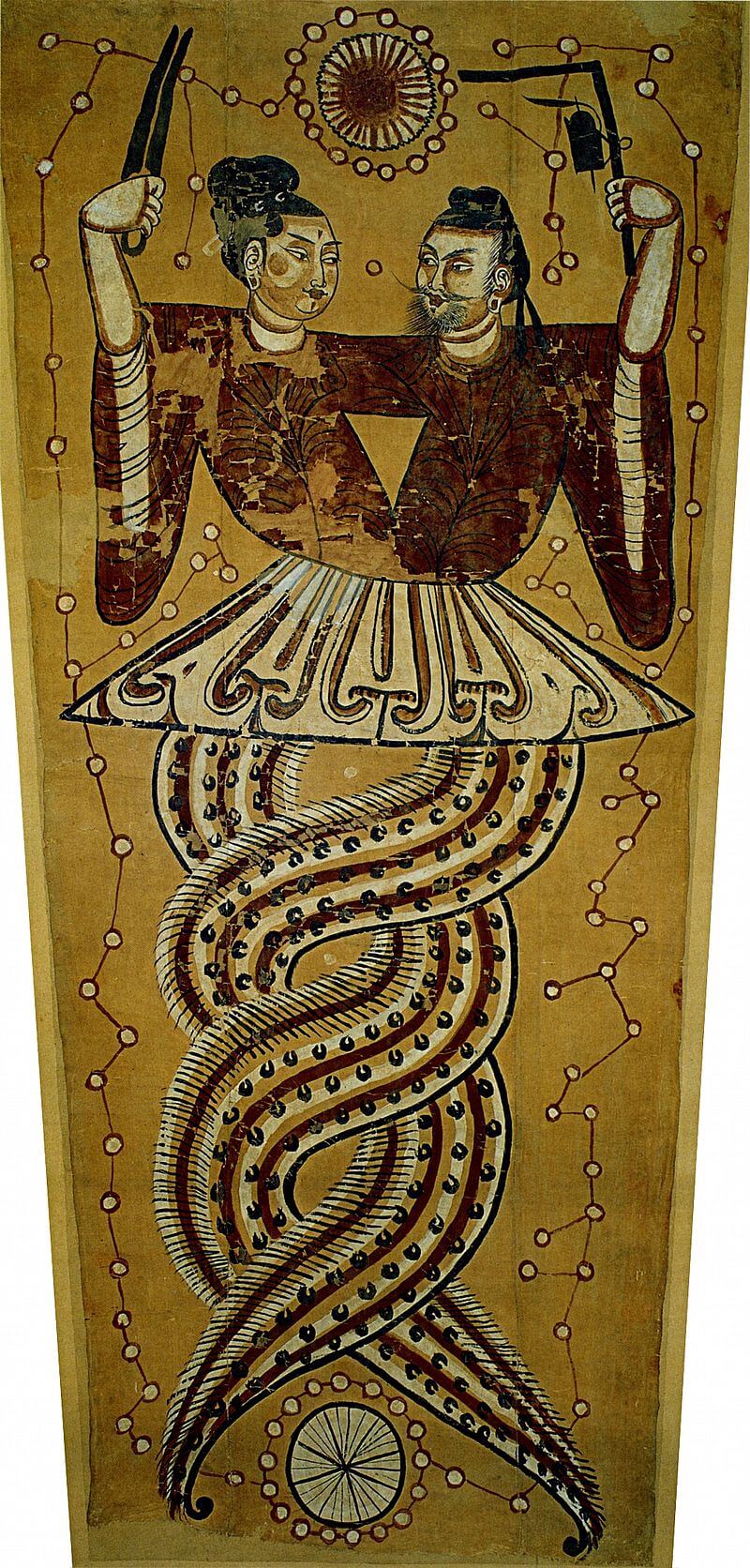
Myths about Fuxi
There are various origin myths about Fuxi, and different tales narrate different stories of what happened next. In central and southern China, Fuxi and Nuwa are believed to be siblings who survived the great flood, and eventually became the parents of humanity.
1. The Flood and Creation Myth
Some stories narrate the childhood of Fuxi and Nuwa with their father and the terrifying thunder god, Lei Gong. Fuxi’s father heard the first rumble of thunder while he was working in the fields. In the myth, the father was able to catch the thunder god with a pitchfork and an iron cage.
According to the legend, the father decided to pickle Lei Gong in a jar, but he had no spices. He instructed Fuxi and Nuwa not to give the thunder god anything to eat and drink. When he left for the market, the thunder god tricked the children, and they gave him water.
As soon as Lei Gong drank water, his powers returned, and he managed to escape. The thunder god rewarded Fuxi and Nuwa with a tooth from his mouth, which when planted would grow into a gourd. Later, the thunder god brought heavy rain and flooding.
By the time the father returned home, he saw the waters rising so he began to build a boat. He prayed for the god of the heavens to end the rain, and the water god was ordered to remove the flood. Unfortunately, the father died when the boat crash on the ground, while Fuxi and Nuwa, clinging on the gourd, survived.
After the flood, Fuxi and Nuwa realized that they were the only humans left on earth, so they asked the permission of gods to get married. They built a bonfire and agreed that if the smoke from the fires intertwined, they would get married. Soon, they saw the sign of the gods’ approval and they got married.
Nuwa gave birth to a ball of flesh, which the couple cut into pieces and scattered in the wind. Wherever the pieces landed, they became human beings. In some accounts, they made clay figures and breathed life into them. Soon, these people became the descendants and subjects of Emperor Fuxi.
This creation story has similarities with the story of the flood in Greek mythology as well as in the Christian Bible. Many ancient mythologies also explained the start of life with a deity blowing into clay.
2. Fuxi and the Dragon King
After the creation of humanity, Fuxi also introduced many inventions to improve the lives of people. He even taught humans how to catch a fish with their hands, so they’d have food to eat. However, the fish were the subjects of the Dragon King, the ruler of rivers and oceans—and he became furious when he knew that his subjects were being eaten.
The Dragon King’s prime minister, a tortoise, suggested that the king should make a pact with Fuxi that he could no longer catch fish with his hands. Eventually, Fuxi invented a fishing net and introduced it to his children. Since then, people began fishing with the use of nets, instead of their bare hands. Later, Fuxi also taught humans the domestication of animals, so they would have a more stable access to meat.
Symbolisms and Symbols of Fuxi
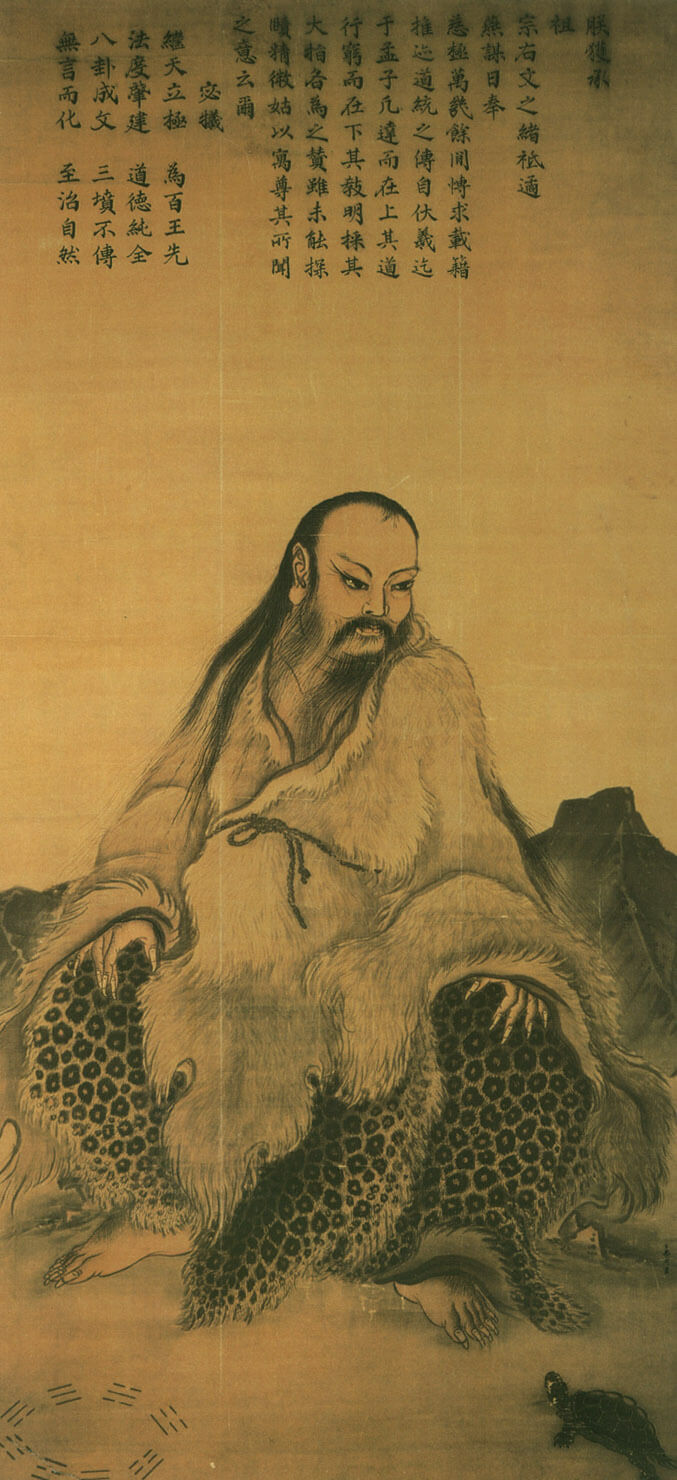
During the Han period, Fuxi began to be paired with Nuwa, who was either his sister or his wife. As a married couple, the two deities were regarded as the patrons of the institutions of marriage. Some historians believe that their story also represents China’s transition from a matriarchal society to a patriarchal culture.
When Fuxi and Nuwa are depicted as half-human, half-serpent, their intertwined tails symbolize yin and yang. While yin represents the feminine or negative principle, yang symbolizes the male or positive principle in nature.
In some illustrations, Fuxi holds a pair of compasses while Nuwa holds a carpenter’s square. In traditional Chinese belief, these instruments are symbols associated with the universe, where the Heaven is round and the Earth is square. They’re also used to represent cosmic order, or a link between heaven and earth.
In some context, the square and compass represent creation, harmony, and social order. In fact, the Chinese words for compass and square are gui and ju respectively, and they form the expression to establish order.
Fuxi in Chinese History
Even though several Chinese texts suggest that Fuxi is a major mythical figure, he plays a minor role in ancient mythology. Some of his narratives can be traced back to the Zhou dynasty, but he only became popular during the Han period.
1. In Literature
During the Han era, Fuxi became famous through an ancient Chinese divination text, the I Ching or The Classic of Changes. He’s thought to have written the Eight Trigrams section of the book, which later became important in traditional Chinese belief and philosophy. In the Appended Texts, he’s referred to as Pao Hsi, a god who observes the natural order of things and teaches his knowledge to humans.
2. In Music
In the Songs of Ch’u, Fuxi played a role in the discovery of melody and music. It’s said that he ordered the creation of musical instruments, and composed the musical tune Chia pien. The xun is an egg-shaped clay flute, while the se is an ancient string plucked instrument, similar to the zither. These instruments were popular in ancient China, and played during ceremonies to symbolize happiness, especially in marriage.
3. In Religion
It’s believed that Fuxi wasn’t regarded as a human during the Han era. In fact, the depictions on stone tablets found in the Shantung Province portrayed him as a half-human, half-serpent, which is also his earliest representation. The discovery of the Eight Trigrams is thought to be responsible for the creation of several Fuxi’s myths. Later, it became the basis of divination of Daoist and folk religions.
In addition to this, Fuxi was confused with another god, Tai Hao, who was an independent divine being before the Han era. The name is derived from the terms Tai and Hao, meaning supreme or great, and brilliant light or expansive and limitless, respectively. Eventually, Fuxi also took the role of the deity who rules over the east and controls the season of spring.
4. Inventions and Discoveries
In Chinese mythology, Fuxi is a god who brought many benefits to humankind. The most famous of his inventions was the Eight Trigrams or Ba Gua, which is now used in feng shui. It’s said that he carefully watched the images on the earth and in the sky and thought about the colors and patterns of beasts and birds. Then he created the symbols in hopes of communicating the virtue of the divinities.
In some versions of the myth, Fuxi discovered the arrangement of the trigrams through the markings at the back of a tortoise—sometimes a mythical dragon horse—from the Luo River. It’s thought that the arrangement even precedes the compilation of The Classic of Changes. Some historians say that the discovery also inspired calligraphy.
Fuxi is also recognized for inventing the knotted cord for measuring distance and calculating time, as well as written characters, calendar and laws. It’s also believed that he established the marriage rule, requiring a young man to give his lady two deerskins as an engagement gift. Some say that he smelted metals and made coins of copper too.
Importance of Fuxi in Modern Culture
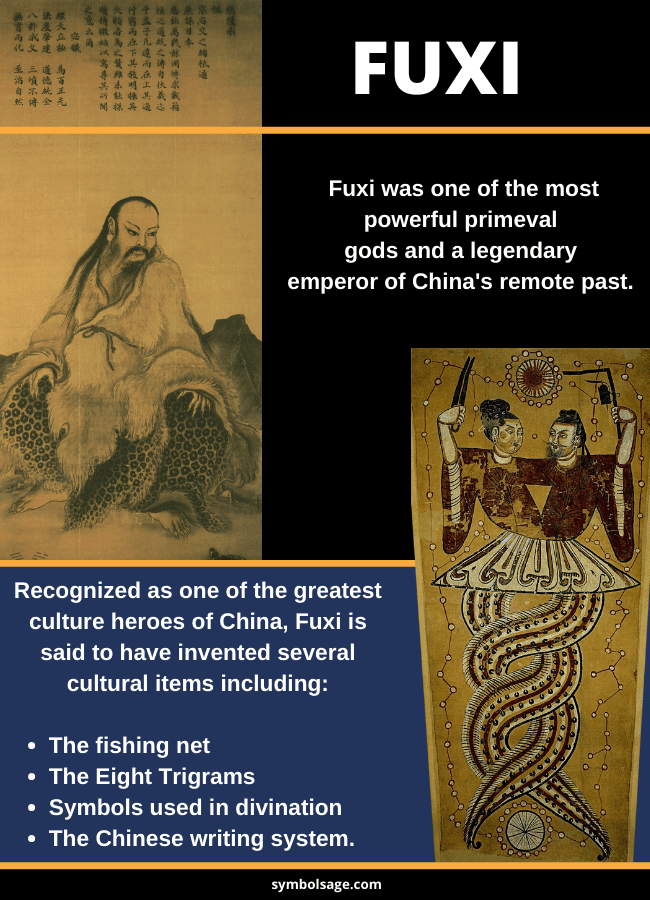
In modern China, Fuxi is still worshipped, especially at the Huaiyang County in Henan Province. The place is also thought to be the hometown of Fuxi. For many ethnic groups, Fuxi is regarded as a human creator, especially to the Maonan, Tujia, Shui, Yao, and Han. The Miao people even regard themselves as descendants of Fuxi and Nuwa, who are believed to be the parents of mankind.
During the lunar cycle from February 2 to March 3, Fuxi’s birthday is celebrated at the Renzu Temple. Some give thanks to their ancestors, while others pray for their blessings. Also, it’s traditional for people to create ninigou or toys made of clay to memorialize how their ancestors created humans from clay. These clay figures include tigers, swallows, monkeys, tortoises and even musical instrument called xun.
In Brief
Fuxi was one of the most powerful primeval gods and a legendary emperor of the remote past. Recognized as one of the greatest culture heroes of China, he is said to have invented several cultural items such as the fishing net, the Eight Trigrams, or symbols used in divination, and the Chinese writing system.




